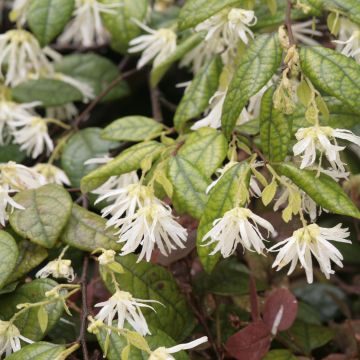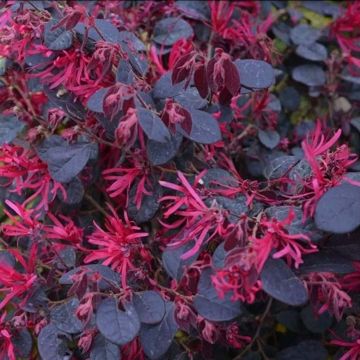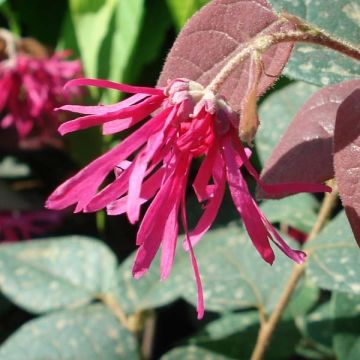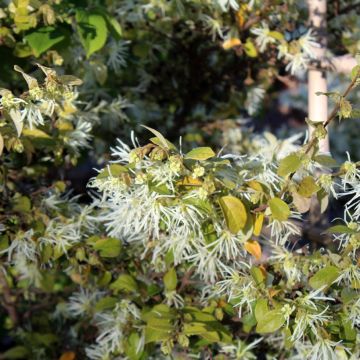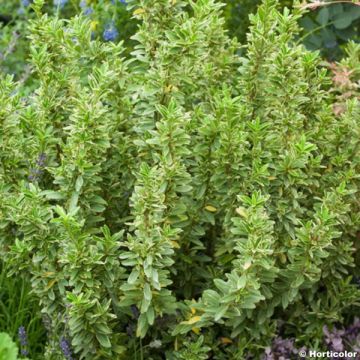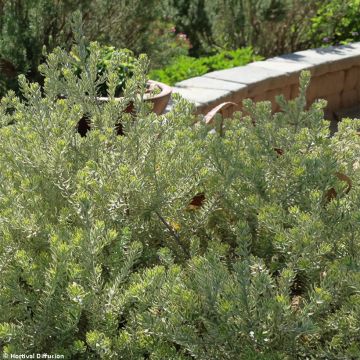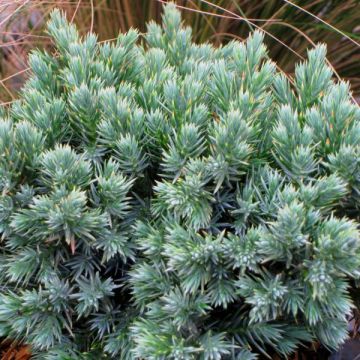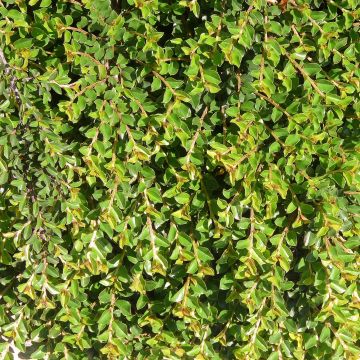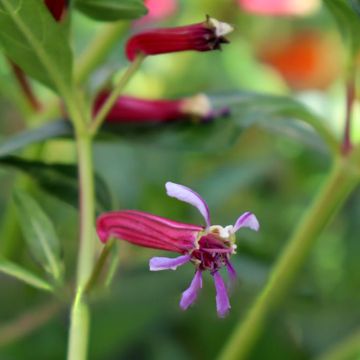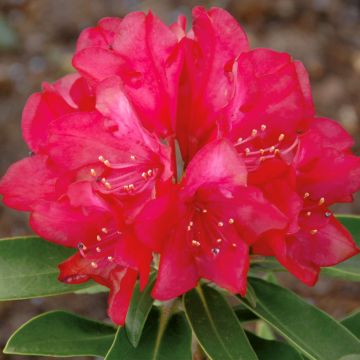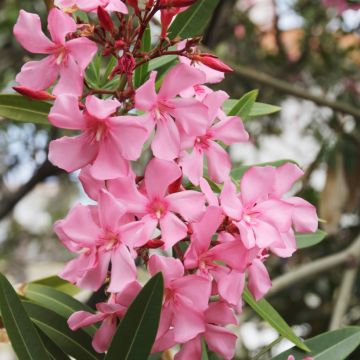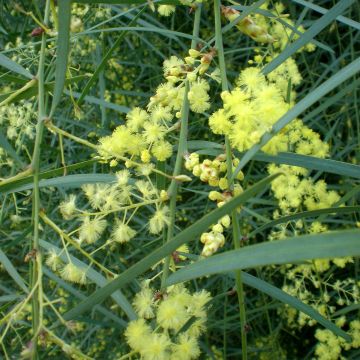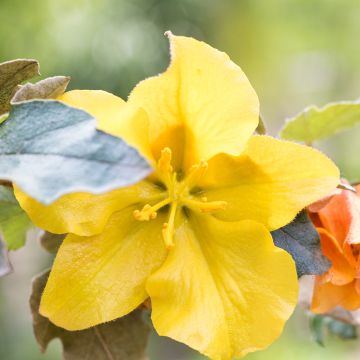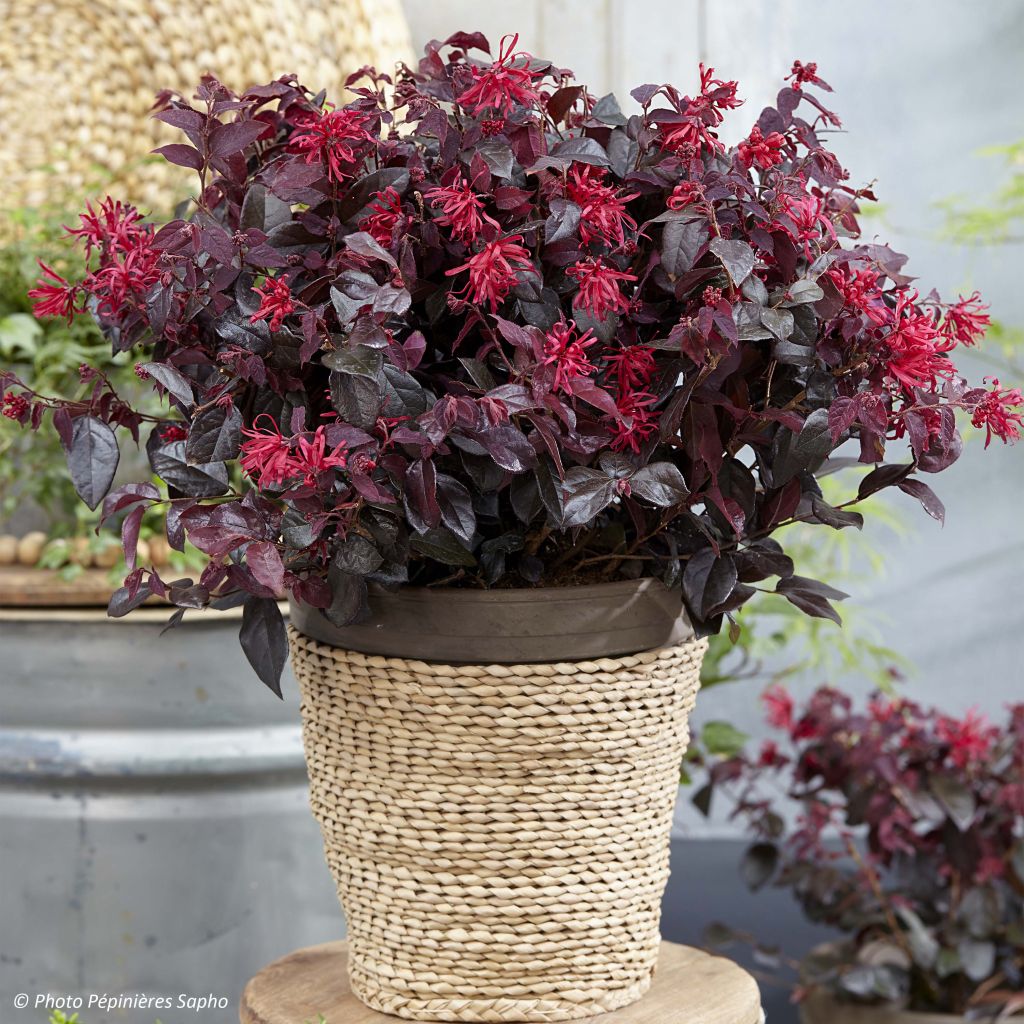

Loropetalum chinense var. rubrum Ever Red - Chinese Witch Hazel
Loropetalum chinense var. rubrum Ever Red - Chinese Witch Hazel
Loropetalum chinense var. rubrum Ever Red (Chang Nian Hong)
Chinese Witch Hazel, Chinese Fringe Flower
This item cannot be shipped to the selected country
Delivery charge from €5.90
Delivery charge from €5.90
More information
Schedule delivery date,
and select date in basket
This plant carries a 24 months recovery warranty
More information
We guarantee the quality of our plants for a full growing cycle, and will replace at our expense any plant that fails to recover under normal climatic and planting conditions.
From €5.90 for pickup delivery and €6.90 for home delivery
Express home delivery from €8.90.
From €5.90 for pickup delivery and €6.90 for home delivery
Express home delivery from €8.90.
Does this plant fit my garden?
Set up your Plantfit profile →
Description
Loropetalum chinense Ever Red 'Chang Nian Hong' is a devilishly attractive new American creation, covered in dark purple-violet evergreen foliage throughout the year. During flowering, the bush lights up, adorned with curious bright red ribbons gathered in small pompoms. This Loropetalum also charms with its compact and slightly spreading habit, well suited to small gardens and container gardening on a terrace. While it proves hardy and relatively tolerant of heat and drought once well established, it still prefers partial shade, mild climates, cool summers, and limestone-free soils.
Loropetalum chinense var. rubrum, or Chinese Fringe Flower with purple leaves, belongs to the Hamamelidaceae family, as evidenced by its 4 long ribbon-like petals that resemble those of Witch Hazel. It is native to the forests of the Himalayas in China and the northern and eastern regions of India, where it grows up to an altitude of 1200m (3937ft). Ever Red is a recently selected cultivar in the USA by Mark Griffith, a specialist in the genus. This cultivar has a bushy, dense and spreading habit, forming a cushion shape. It will reach a height of about 80cm (32in) and a width of 1m (3ft) at maturity. Over time, it can spread and grow to reach 1.75m (6ft) in all directions. It develops evergreen foliage in moderately cold climates. The leaves, entire and ovate in shape, measuring 2 to 5cm (1 to 2in) in length, are red when they first emerge, then take on a very dark purple-violet colour that they retain throughout the season. The abundant, honey-scented and nectar-rich flowering occurs from March to May, earlier or later depending on the climate, and lasts about 3 weeks. The flowers, larger than those of other Loropetalum, are grouped in 3 to 6 at the axil of the leaves along the branches. They are composed of 4 slightly twisted ribbon-like petals, bright red in colour, and have a slight fragrance. The almost flashy red tone of the flowers creates a magnificent contrast with the dark colour of the foliage.
Loropetalum is a perfect plant. Interesting in all seasons, well suited for container gardening, and not space-consuming, it appeals to every gardener. It stands out in spring scenes, beautifully coloured when the garden is still sparsely blooming. The honey-scented flowers are also a good source of nectar for bees early in the season. While the shrub is relatively hardy once well established, young plants can suffer from temperatures as low as -6 or -7°C (21.2 or 19.4°F), so they will need protection from severe frost. You can grow it in containers in cold regions, using non-limestone but fertile soil, and store it indoors in winter. It can be used in an informal hedge or within a shrub bed enriched with ericaceous soil for staggered flowering alongside camellias, shrubby heathers, witch hazels, azaleas and rhododendrons, Andromeda and Hydrangea, for example. Like deciduous azaleas, with which it forms sublime combinations, Ever Red is fairly water-efficient once well established. In neutral soil and mild climates, it complements the flowering of China roses ('Old Blush', chinensis mutabilis, x odorata), starting in February.
Report an error about the product description
Loropetalum chinense var. rubrum Ever Red - Chinese Witch Hazel in pictures
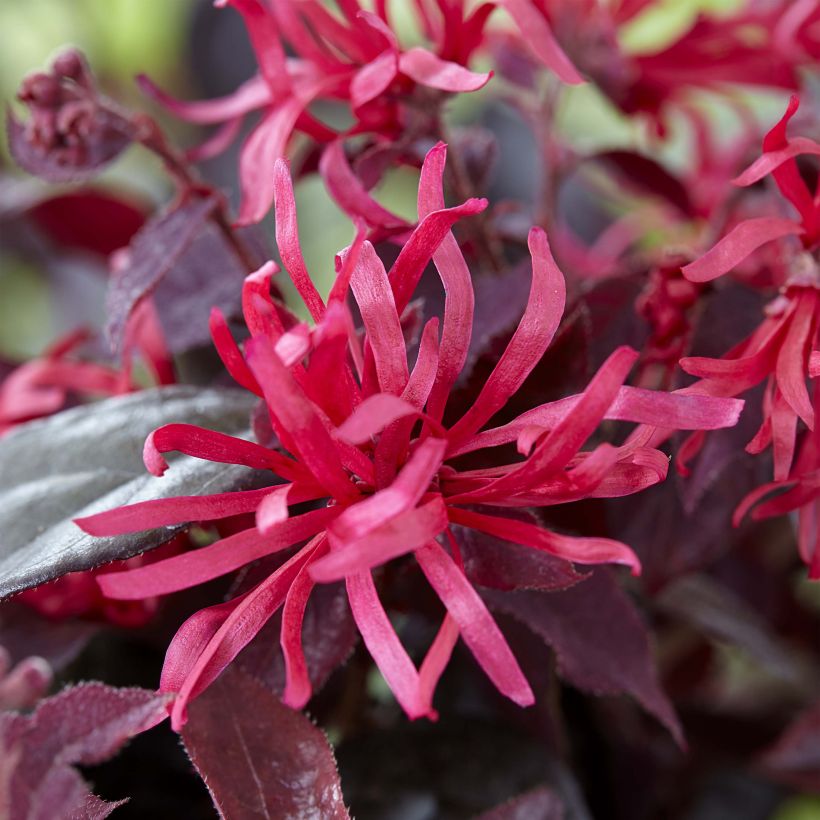

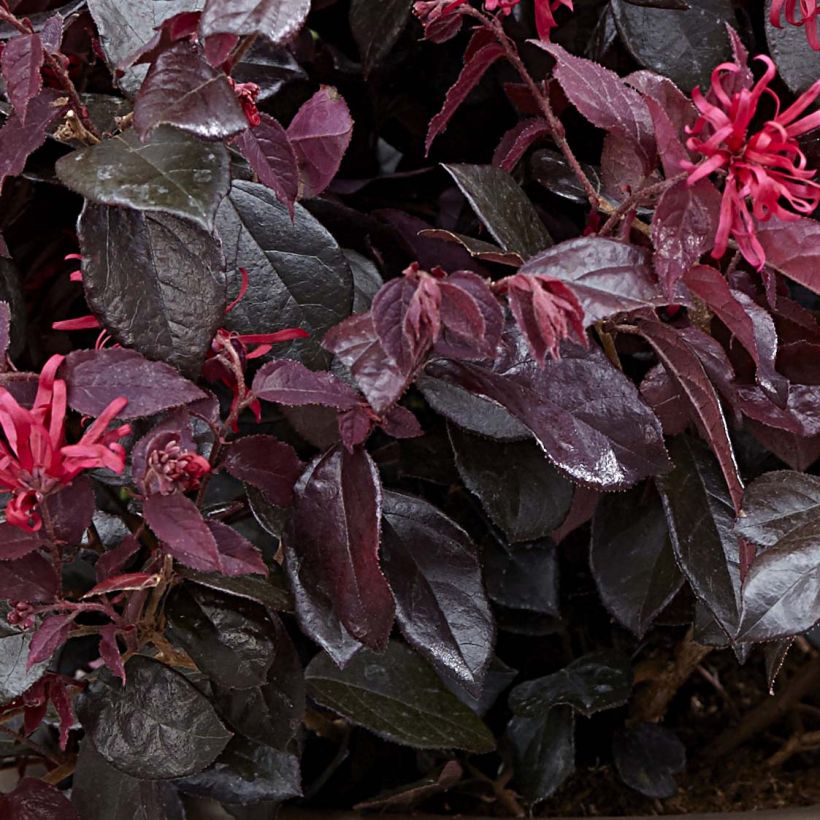

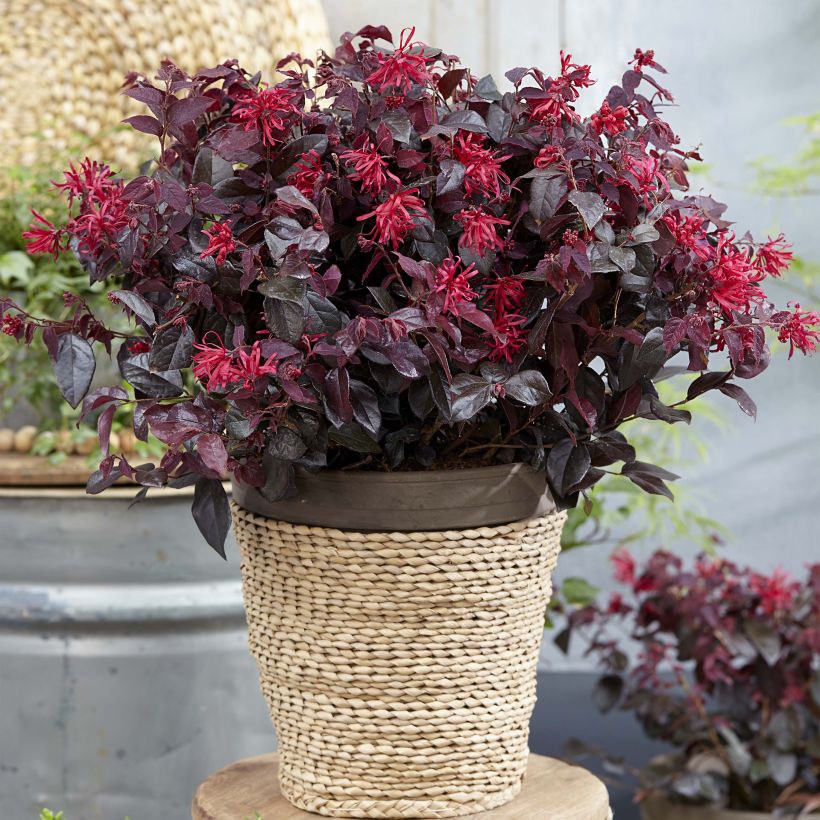

Plant habit
Flowering
Foliage
Botanical data
Loropetalum
chinense var. rubrum
Ever Red (Chang Nian Hong)
Hamamelidaceae
Chinese Witch Hazel, Chinese Fringe Flower
Cultivar or hybrid
Other Loropetalum
Planting and care
Plant in a sunny but not scorching location (morning sun) or in partial shade (especially in hot climates), in moist but well-drained, light, fertile, slightly acidic or even slightly alkaline, soil. However, Loropetalum chinense is robust and relatively tolerant of different soil types. It can tolerate slightly alkaline soils and is fairly drought-resistant once established in deep soil, with its base shaded by large perennials or small bushes. It does not tolerate excessive water, which can cause its roots (curiously coloured red) to rot. Therefore, it requires good drainage: place 20cm (8in) of coarse sand, clay pellets, non-calcareous gravel, or pumice at the bottom of the planting hole. Add compost to the garden soil, leaf mould, and optionally some sand to lighten it. This bushy shrub will reach a size equivalent to its height, about 1.75m (6ft), if given enough time to spread, so make sure to provide enough space when planting. When grown in a pot, choose a large container with gravel or broken pieces at the bottom to aid drainage. Watering should preferably be done with slightly alkaline water or rainwater.
Diseases and pests: This bush is susceptible to root rot in poorly drained soil. It could also be attacked by olive gall, which can be fatal.
It is mainly propagated by cuttings taken from the ends of the stems in late summer.
Planting period
Intended location
Care
-
, onOrder confirmed
Reply from on Promesse de fleurs
Evergreen shrubs
Haven't found what you were looking for?
Hardiness is the lowest winter temperature a plant can endure without suffering serious damage or even dying. However, hardiness is affected by location (a sheltered area, such as a patio), protection (winter cover) and soil type (hardiness is improved by well-drained soil).

Photo Sharing Terms & Conditions
In order to encourage gardeners to interact and share their experiences, Promesse de fleurs offers various media enabling content to be uploaded onto its Site - in particular via the ‘Photo sharing’ module.
The User agrees to refrain from:
- Posting any content that is illegal, prejudicial, insulting, racist, inciteful to hatred, revisionist, contrary to public decency, that infringes on privacy or on the privacy rights of third parties, in particular the publicity rights of persons and goods, intellectual property rights, or the right to privacy.
- Submitting content on behalf of a third party;
- Impersonate the identity of a third party and/or publish any personal information about a third party;
In general, the User undertakes to refrain from any unethical behaviour.
All Content (in particular text, comments, files, images, photos, videos, creative works, etc.), which may be subject to property or intellectual property rights, image or other private rights, shall remain the property of the User, subject to the limited rights granted by the terms of the licence granted by Promesse de fleurs as stated below. Users are at liberty to publish or not to publish such Content on the Site, notably via the ‘Photo Sharing’ facility, and accept that this Content shall be made public and freely accessible, notably on the Internet.
Users further acknowledge, undertake to have ,and guarantee that they hold all necessary rights and permissions to publish such material on the Site, in particular with regard to the legislation in force pertaining to any privacy, property, intellectual property, image, or contractual rights, or rights of any other nature. By publishing such Content on the Site, Users acknowledge accepting full liability as publishers of the Content within the meaning of the law, and grant Promesse de fleurs, free of charge, an inclusive, worldwide licence for the said Content for the entire duration of its publication, including all reproduction, representation, up/downloading, displaying, performing, transmission, and storage rights.
Users also grant permission for their name to be linked to the Content and accept that this link may not always be made available.
By engaging in posting material, Users consent to their Content becoming automatically accessible on the Internet, in particular on other sites and/or blogs and/or web pages of the Promesse de fleurs site, including in particular social pages and the Promesse de fleurs catalogue.
Users may secure the removal of entrusted content free of charge by issuing a simple request via our contact form.
The flowering period indicated on our website applies to countries and regions located in USDA zone 8 (France, the United Kingdom, Ireland, the Netherlands, etc.)
It will vary according to where you live:
- In zones 9 to 10 (Italy, Spain, Greece, etc.), flowering will occur about 2 to 4 weeks earlier.
- In zones 6 to 7 (Germany, Poland, Slovenia, and lower mountainous regions), flowering will be delayed by 2 to 3 weeks.
- In zone 5 (Central Europe, Scandinavia), blooming will be delayed by 3 to 5 weeks.
In temperate climates, pruning of spring-flowering shrubs (forsythia, spireas, etc.) should be done just after flowering.
Pruning of summer-flowering shrubs (Indian Lilac, Perovskia, etc.) can be done in winter or spring.
In cold regions as well as with frost-sensitive plants, avoid pruning too early when severe frosts may still occur.
The planting period indicated on our website applies to countries and regions located in USDA zone 8 (France, United Kingdom, Ireland, Netherlands).
It will vary according to where you live:
- In Mediterranean zones (Marseille, Madrid, Milan, etc.), autumn and winter are the best planting periods.
- In continental zones (Strasbourg, Munich, Vienna, etc.), delay planting by 2 to 3 weeks in spring and bring it forward by 2 to 4 weeks in autumn.
- In mountainous regions (the Alps, Pyrenees, Carpathians, etc.), it is best to plant in late spring (May-June) or late summer (August-September).
The harvesting period indicated on our website applies to countries and regions in USDA zone 8 (France, England, Ireland, the Netherlands).
In colder areas (Scandinavia, Poland, Austria...) fruit and vegetable harvests are likely to be delayed by 3-4 weeks.
In warmer areas (Italy, Spain, Greece, etc.), harvesting will probably take place earlier, depending on weather conditions.
The sowing periods indicated on our website apply to countries and regions within USDA Zone 8 (France, UK, Ireland, Netherlands).
In colder areas (Scandinavia, Poland, Austria...), delay any outdoor sowing by 3-4 weeks, or sow under glass.
In warmer climes (Italy, Spain, Greece, etc.), bring outdoor sowing forward by a few weeks.

































